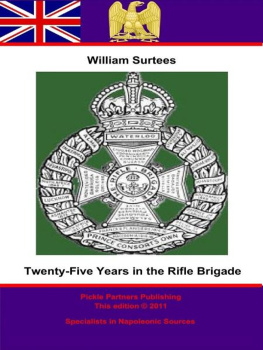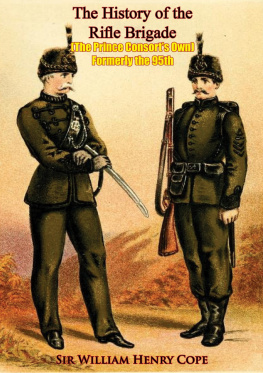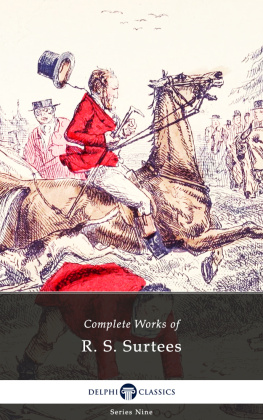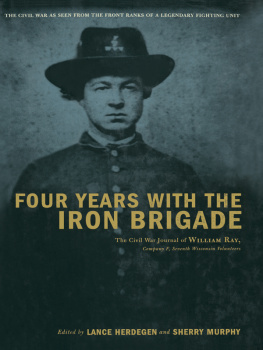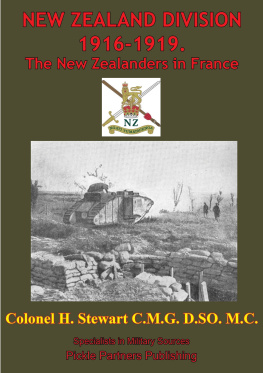Quartermaster William Surtees - Twenty-Five Years in the Rifle Brigade
Here you can read online Quartermaster William Surtees - Twenty-Five Years in the Rifle Brigade full text of the book (entire story) in english for free. Download pdf and epub, get meaning, cover and reviews about this ebook. year: 2011, publisher: Wagram Press, genre: Non-fiction. Description of the work, (preface) as well as reviews are available. Best literature library LitArk.com created for fans of good reading and offers a wide selection of genres:
Romance novel
Science fiction
Adventure
Detective
Science
History
Home and family
Prose
Art
Politics
Computer
Non-fiction
Religion
Business
Children
Humor
Choose a favorite category and find really read worthwhile books. Enjoy immersion in the world of imagination, feel the emotions of the characters or learn something new for yourself, make an fascinating discovery.
- Book:Twenty-Five Years in the Rifle Brigade
- Author:
- Publisher:Wagram Press
- Genre:
- Year:2011
- Rating:5 / 5
- Favourites:Add to favourites
- Your mark:
- 100
- 1
- 2
- 3
- 4
- 5
Twenty-Five Years in the Rifle Brigade: summary, description and annotation
We offer to read an annotation, description, summary or preface (depends on what the author of the book "Twenty-Five Years in the Rifle Brigade" wrote himself). If you haven't found the necessary information about the book — write in the comments, we will try to find it.
Twenty-Five Years in the Rifle Brigade — read online for free the complete book (whole text) full work
Below is the text of the book, divided by pages. System saving the place of the last page read, allows you to conveniently read the book "Twenty-Five Years in the Rifle Brigade" online for free, without having to search again every time where you left off. Put a bookmark, and you can go to the page where you finished reading at any time.
Font size:
Interval:
Bookmark:
T. CADELL, STRAND, LONDON.
MDCCCXXXIII.
PRINTED BY BALLANTYNE AND COMPANY, PAUL'S WORK, CANONGATE.
MAJOR-GEN. SIR ANDREW F. BARNARD,
K.C.B. and K.C.H.
AND THE OFFICERS OF THE RIFLE BRIGADE,
THESE REMAINS OF MY DECEASED BROTHER
ARE MOST RESPECTFULLY DEDICATED,
BY THEIR OBLIGED AND MOST
OBEDIENT SERVANT,
Birth and ParentageEnters the MilitiaVolunteers into the LineJoins the army destined for HollandThe troops embark at DealLand at the HelderLaxity of disciplineMarch for SchagenDetachment under Sir Ralph Abercromby sent to surprise HoorneHoorne surrenders,
The Russian Allies carry BergenAllow themselves to be surprised, and the whole army forced to retire to their former positionSkirmishing in the vicinity of Old PattenThe Russians endeavour to force their way back to BergenThe Russian and British forces joinedThe enemy forced to abandon Egmont-op-ZeeAlkmaar surrendersThe troops advance to Egmont BinnenSkirmishingGeneral engagementThe Enemy repulsedThe Forces retire to Zaand WyckArmistice concludedReturn to England,
Arrive in EnglandThe Pompadours embark for IrelandArrive at KinsalePrivations in Ireland in 1800Peace concludedOur Author resolves to return home, but ultimately volunteers into the Rifle Corps or 95thEmbarks for England, and joins his Regiment at SussexIs promoted,
Made Pay-sergeantMoral ReflectionsWreck of a Dutch East IndiamanReduced OfficersWar with France in 1803Encampment at Thorncliffe under the command of General Sir John MooreEncampment broke up, November 1804Embark for Germany, October 1805Vicissitudes at SeaLand at CuxhavenMarch to BremenOutposts establishedRetrograde movements, in consequence of the defeat of the Allied Forces at AusterlitzThe Allied Forces evacuate GermanyRe-embarkation of the troopsThe Rifle Corps, or 95th, land at Yarmouth,
Our Author made Quartermaster-Sergeant of the 2d battalion, which he joins at Feversham, KentExpedition to DenmarkEmbark at DealLand at Vedbeck, ZealandPartial EngagementsSiege of CopenhagenA division under Sir Arthur Wellesley advance to KiogeCopenhagen capitulatesAmnesty between the Danish forces in the Island of Zealand, and the BritishThe British evacuate DenmarkEmbark at CopenhagenArrive in the DownsLand at Deal,
Our Author marriesThe Battalion to which he belongs ordered to join the Expedition fitting out for CorunnaMovements of the Army in SpainReturn to England,
VolunteeringFarther PromotionEmbarks for Portugal, with two Companies of the Second BattalionDebark at CadizAdvance to the IslaThe French occupy all the adjacent Towns, except Cadiz and IslaCannonadingSpanish ArmyDetachment of the Allied Army sent round by Gibraltar and Chiclana, to take the Enemy in the rear of his works, and compel him either to fight or abandon themCome up with a portion of the Enemy in the vicinity of VegerBravery of the BritishThe Enemy repulsed with great loss, but, from the apathy and misconduct of General La Pena, and the Spaniards under his command, the French are allowed to retain their Works in the vicinity of Cadiz,
The 2d Battalion of the Pompadours ordered to proceed to PortugalOur Author visits EnglandReturns to Portugal, and joins his Regiment at RodrigoThe Army move towards BadajosSiege of BadajosBadajos surrendersInsubordination among the TroopsQuelled by the prompt measures of Lord Wellington,
The Army leave Badajos on the 11th of April, and move into quarters near the river Agueda, where they remain, till the 11th of JuneAdvance towards Salamanca, which, with the exception of three Forts, the enemy had evacuatedThe Forts investedThe main bodies of both armies bivouack within a mile and a half of each other, in the vicinity of Monte Rubio and MoriscoThe Forts of Salamanca surrenderThe main body of the Enemy retire to TordesillasMovements of the Army,
Preparations for the FieldAmusements in winter quartersGrand ReviewAdvance of the Army in pursuit of the EnemyCome up with their rearguard in the vicinity of Hornilla de CaminoSkirmishingEncounter with the 1st Brigade of the Enemy, who are beaten, and forced to retreatOur Army advance in pursuitAn affair between the rearguard of the Enemy and our 4th BrigadeVittoriaGeneral EngagementThe Enemy defeatedRemarks,
Advance in pursuit of the EnemyOur Forces retreat, in order to counteract Soult's movements for the succour of PamplonaTotal defeat of Soult in the several Actions near PamplonaOur Forces again advanceCome up with the retreating Enemy at the Bridge of YanziThe Enemy take up a position, behind VeraA considerable body of the Enemy attached at the Pass of Echallar, and forced to retreat,
The Author, from a mistake, loses his Servants for a few daysA Feast of DeathA Feast of LifeFighting near St SebastianSingular instance of Spanish BraverySt Sebastian is captured, but no Details given, the Author not having been presentAttack of the Pass of Vera,
Font size:
Interval:
Bookmark:
Similar books «Twenty-Five Years in the Rifle Brigade»
Look at similar books to Twenty-Five Years in the Rifle Brigade. We have selected literature similar in name and meaning in the hope of providing readers with more options to find new, interesting, not yet read works.
Discussion, reviews of the book Twenty-Five Years in the Rifle Brigade and just readers' own opinions. Leave your comments, write what you think about the work, its meaning or the main characters. Specify what exactly you liked and what you didn't like, and why you think so.

